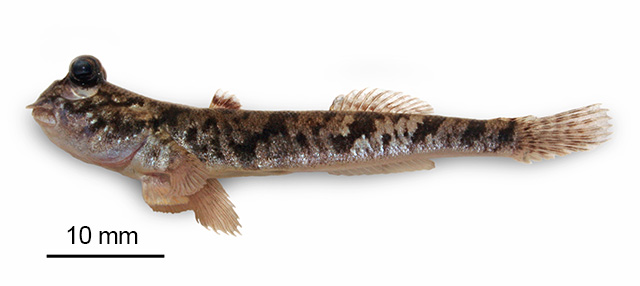| Oxudercidae (Mudskippers), subfamily: Periophthalminae |
| 4.55 cm SL (male/unsexed) |
|
demersal; freshwater; brackish |
| Oceania: Australia in Northern Territory and Western Australia. |
|
Dorsal spines (total): 5-7; Dorsal soft rays (total): 10-12; Anal spines: 1-1; Anal soft rays: 11-13. Can be distinguished by the following characters: body depth at anal fin origin 10.6-14.6% of SL, mean 12.7%; unique among Periophthalmus species in having a greatly reduced first dorsal fin (depressed dorsal 5.1-9.6% of SL) in both sexes, and usually with only five spines, fin widely separated from second dorsal fin origin; pelvic fins united for half their length,
distinct fraenum present, posterior tips of fins pointed to bluntly pointed, fifth ray bifurcating close to base and branching about 9 times; first dorsal fin plain blackish except for slightly paler base and narrow whitish margin; second dorsal fin translucent with broad submarginal black band and a row of black spots or blotches along fin base; no melanophores on anal
fin; pelvic fins whitish or with some fine speckling; orange spots may be present on lower side of head and body when live; second dorsal fin rays modally I,11; anal fin rays modally I,12; pectoral rays 11-13; caudal fin rays usually only with ventralmost 6-7 rays branched, dorsalmost 8-9 rays rarely branched; lateral scales 58-78; predorsal scales usually 24-25 (Ref. 76839). |
|
|
Not Evaluated (N.E.) Ref. (130435)
|
| harmless |
Source and more info: www.fishbase.org. For personal, classroom, and other internal use only. Not for publication.
